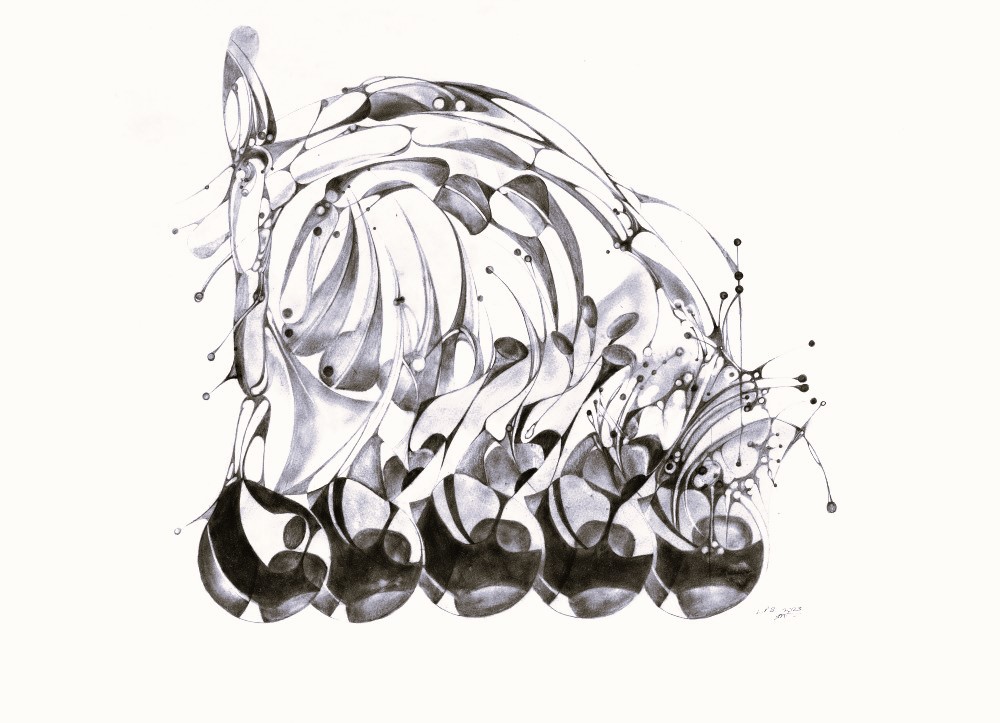
Image by Lillian Palser Barto
Once, I was sitting in my therapist’s office, and she asked me the question ‘Why do you write poetry?’ It’s a very good question; one with many answers, half of which I couldn’t articulate here. I responded to her with something like, ‘It helps me to understand my internal environment.’ In this sixth volume of Tell Me Like You Mean It, Victoria Winata asks, poetically, ‘how will I be able to think completely without speaking?’ This is a bit like what I was getting at with my therapist, I think. That, through expressing the internal amalgamation of yesterday’s cereal and the swan in the river and my mother in her sunglasses looking at me, all that which comes through my retinas and then does things inside of me, also must come out of me, and in a form which evokes what it has done inside of me.
Further on in Winata’s poem, the speaker, while anticipating a solo visit to an impressionist exhibition, admits ‘I’d like it if I spoke to you as I was looking.’ I wonder, as I read this line, if this is what poets are doing all of the time. We communicate with our readers as we look at the world, much like an exhibit. We write as we live. In curating this publication, I felt a sense that I was engaging with work that was made up of deeply intimate moments of encountering a self; of oneself, looking at the world.
If we were to talk through-lines in this volume of work, there is one that especially piques my interest: the notion of rotations and orbits. This is particularly fascinating given Saturn’s recent return to the astrological sign of Pisces. Furthermore, I wonder about the impact of the pandemic and State-sanctioned 5km orbits; these little rotations we made in our spaces every day. Rotations of living in a neoliberal world are painful, and expressed as such in the opening line of Nejra Prelic’s poem, ‘I get up/perform my alienations’ and later, ‘the same disconsolate anomie/the same peptic work’. The soullessness of paperwork; being made subject to bureaucratic processes of dehumanisation in Kit Kavanagh-Ryan’s ‘NDIS Access Request Form 2022’, where repetition and circularity culminate in having the poem itself slowly close in on the reader.
Along with rotations, there is also, perhaps bizarrely, human-as-plant, as in Vivian Blaxell’s ‘The Mommy Sutra’ and, of course, ‘My Kathy Acker’ by Abbra Kotlarczyk. I am not sure why Kathy Acker is a tree, but she is, and she needs to be. There was a time when nature poems were very much ‘out of style’, which was certainly some modernist bullshit, and thankfully seems not to be the case anymore. In fact, when I read a poem which is in some way an ode to the natural world (as in ‘My Kathy Acker’) I feel the sense that these kinds of tender, close studies/love poems are truly precious, vital and necessary in an age of rapidly accelerating ecological deterioration.
Vivian Blaxell: The Mommy Sutra
Sharon Du: Sidereal Period
Nejra Prelic: alienations
Kori Miles: Incantation for Revolt
Kit Kavanagh-Ryan: NDIS Access Request Form 2022
Derek Chan: In the Snows of My Twenty Fifth Year
Rory Green: lessons
Dominic Guerrera: some sort of silence
Tyberius Larking: Repatriate
Patrick Mercer: Pentridge Prison Dreaming
Freya Daly Sadgrove: HORSE POLO TONGUE SWALLOW
Graham Akhurst: New York City
Max Koetsier: painkillers
Victoria Winata: Pissaro’s Flowers
Alston Chu: artificial horizon B
Kiara Lindsay: I am in the lake
Abbra Kotlarczyk: My Kathy Acker
There’s a lot of unsettling stuff going on in this volume generally. Both unsettling in tone (read: eerie) and unsettling in the most productive, political sense of the word. To ‘unsettle’ what is socially settled. Pentridge Prison is painted in its terrifying hub-apartment-complex-nightmare in ‘Pentridge Prison Dreaming’ by Patrick Mercer, where Mercer uses rhymed couplets to create a haunting, sing-song melody about the terror of this historical and modern institution. In ‘artificial horizon B’, Alston Chu opens their poem with ‘we have bred a new animal’, and concludes the stanza with ‘its/vast totality left to the drink and/sweet iron scent/of its own end’. I can think, here, of many beasts which we have bred but which will eventually destruct; capitalism, neoliberalism, for example.
Then there are moments of joy, nostalgia, revolt, of coming to know oneself and then know oneself again, and so never really knowing oneself, but learning and continuing to learn, as in ‘lessons’ by Rory Green. I would like to speak of every poem individually, because all of the poems in this collection are truly, wildly good. I would, however, be here all day, and think it best to leave you to read it yourself. Perhaps reading this collection will bring you closer to answering the question of why you choose to read poetry. If living is to make the external world internal, then poetry makes it external again. Reading then makes it internal, again and again, in orbit.









